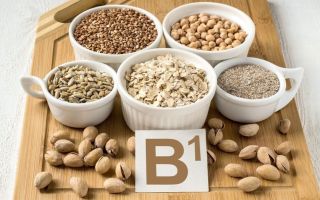Content
- 1 What does the body need vitamin B1 for?
- 2 What vitamin B1 contains
- 3 Daily intake of vitamin B1
- 4 Vitamin B1 hypervitaminosis
- 5 Lack of vitamin B1
- 6 Preparations with vitamin B1
- 7 How to take vitamin B1
- 8 Combining thiamine with other vitamins
- 9 Precautions
- 10 Contraindications and side effects
- 11 Conclusion
Well-being and adequate functioning of the organs and systems of the body ensures the supply of a sufficient amount of useful substances, one of which is thiamine (B1). It is a water-soluble compound that contains sulfur. Vitamin thiamin provides cellular elements with the necessary energy.
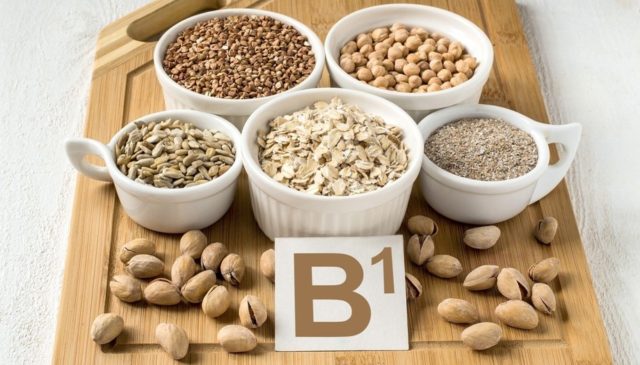
What does the body need vitamin B1 for?
The function of vitamin B 1 has been studied quite well. The substance is called differently:
- thiamine;
- thiamine pyrophosphate;
- thio-vitamin;
- aneurin.
The substance takes part in the regulation of the metabolism of fats and carbohydrates. It is thanks to vitamin B1 that energy is produced, which is necessary for the purpose of performing functions and maintaining the vital activity of the body. The component is responsible for preparing for cell division.
Thiamine promotes the conversion of fats and carbohydrates into a specific form, whereby cells can assimilate and use them for life. Vitamin B1 deficiency leads to impaired reproduction and functioning of cellular elements.
The lack of a useful component is manifested by malfunctions in the nervous system, since it is necessary for the transmission of impulses. Tics, muscular dystonia develop gradually, lack of sensitivity is noted.
Experts call the following beneficial properties of thiamine:
- improving mental and cognitive abilities;
- normalization of mood appetite;
- improving brain function, microcirculation;
- stimulation of muscle and bone growth;
- increasing thinking skills;
- slowing down the aging process;
- reducing the negative impact of smoking and drinking alcohol;
- support of tone, adequate functioning of the myocardium;
- elimination of motion sickness;
- reduction in the severity of toothache after dental procedures.
The substance is also used as an external agent for enriching shampoos. A mask with vitamin b1 allows you to preserve the beauty of your hair. When thiamine is added to creams and serums, it is possible to eliminate acne and wrinkles.
What vitamin B1 contains
The following sources of vitamin B 1 are named:
- Pine nuts;
- sunflower seeds;
- Brown rice;
- pork;
- peanut;
- peas;
- yeast;
- soybeans, beans, lentils;
- offal;
- chicken egg;
- cauliflower, asparagus, potatoes;
- bread (wholemeal flour);
- oat, buckwheat and millet groats;
- oranges.
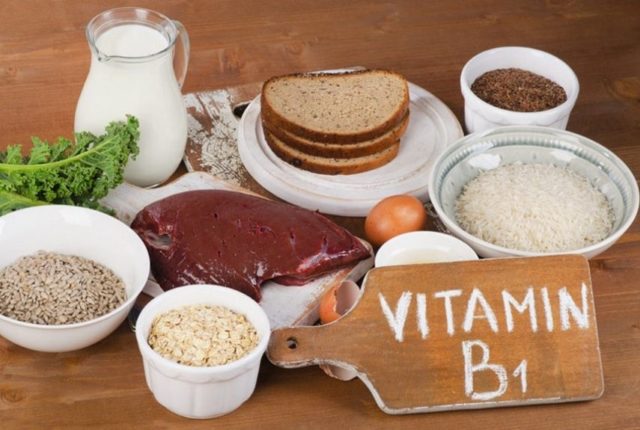
Daily intake of vitamin B1
Thiamine is known to be absorbed fairly quickly from the small intestine into the bloodstream. The maximum daily dose is 10 mg. A larger amount is not absorbed into the bloodstream, but is excreted in the feces from the body.
The B1 absorption process is impaired in the following pathologies:
- stomach ulcer (duodenal ulcer);
- colitis.
After entering the bloodstream, the substance is carried through the tissues to the cells, where it performs its functions. Then thiamine is destroyed in the liver area.
The recommended dosage depends on the needs of a particular organism, related to the rate of metabolic processes, age:
- 0-6 months - 0.2 mg;
- 6-12 months - 0.3 mg;
- 1-3 years - 0.5 mg;
- 4-8 years old - 0.6 mg;
- 9-13 years old - 0.9 mg.
The norms in adolescence are:
- girls 14-18 years old - 1 mg;
- boys from 14 years old - 1.2 mg.
Specialists have defined the following standards for women:
- 19 years and older - 1.1 mg;
- during pregnancy - 1.1 mg;
- during lactation - 1.4 mg.
Vitamin B1 hypervitaminosis
An excess of nutrient is extremely rare due to its water-soluble properties. The component is excreted from the body in a natural way. Thus, it is impossible to get hypervitaminosis if the substance enters the body only with food.
High doses of synthetic drug in the form of injections can provoke an overdose. In this case, a decrease in pressure, an increase in temperature, and the appearance of allergies are possible.
Lack of vitamin B1
Thiamine does not accumulate in various tissues to form a significant reserve. That is why it is necessary to ensure its daily intake with food. Deficiency of the substance leads to the following consequences:
- hypovitaminosis - moderate signs of a lack of a component;
- vitamin deficiency is a deep lack of vitamin B1, which causes serious illness (Korsakov's syndrome).
The appearance of characteristic deficiency symptoms is associated with a violation of protein, fat and carbohydrate metabolism. In the blood, there is an accumulation of products of insufficient processing, for example, lactic acid. Metabolites, penetrating into the brain, disrupt its functioning due to its high toxicity.
Lack of substance disrupts the functioning of the following cells:
- nervous;
- muscle;
- cordial.
Against the background of the deficit, the occurrence of neurological disorders, gait instability, constipation, delayed physical development (in children) is noted. The following signs of B1 hypovitaminosis are called:
- tearfulness, irritability, depression, fatigue, sleep disturbances;
- decreased concentration and memory, headaches;
- deterioration in appetite, coordination of movements;
- tremor;
- nausea, diarrhea;
- muscle weakness, leg pain;
- tachycardia;
- lowering the pain threshold;
- burning sensation in the limbs, their swelling;
- losing weight;
- enlargement of the liver.
Lack of treatment for the lack of a substance contributes to the development of vitamin b1 vitamin deficiency and the following symptoms:
- persistent headache;
- polyneuritis;
- paralysis;
- amyotrophy;
- general weakness.
Usually, vitamin deficiency develops in people who abuse alcohol.
Preparations with vitamin B1
The health benefits of vitamin B1 are undeniable. The substance is used in the following forms:
- thiamine;
- benfotiamine;
- phosphotiamine;
- cocarboxylase.
Cocarboxylase is a lyophilisate for the preparation of solutions. This form preserves the useful properties of the substance better, but it has certain difficulties in preparation for subsequent use. Ampoules containing a ready-made thiamine solution are used immediately after opening.
Oral preparations are presented in the following forms:
- tablets;
- dragee;
- capsules.
Among the most popular vitamin products are called:
- Benfogamma 150... The drug is released in the form of tablets and pills.
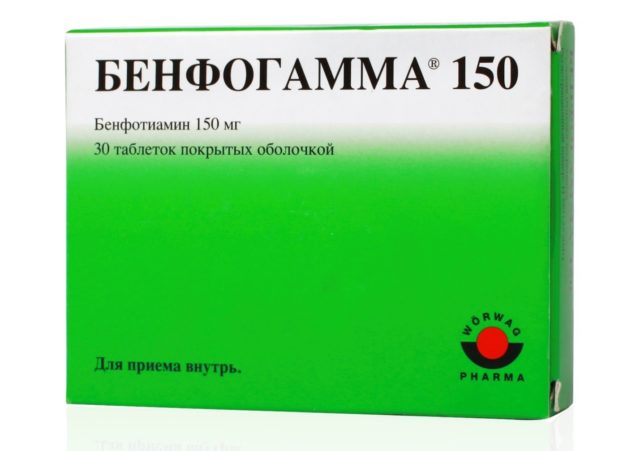
- Benfotiamine... The tablets contain 5 or 25 mg of the active ingredient.
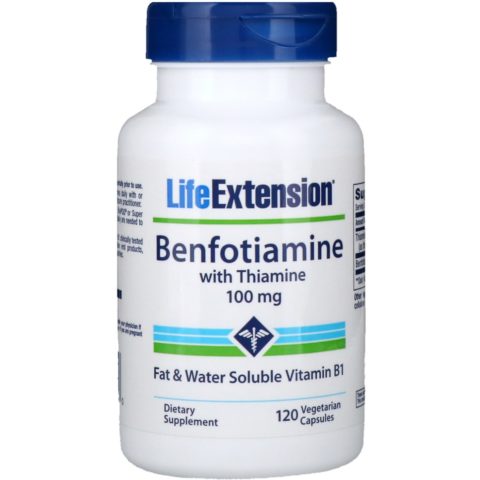
- Thiamine hydrochloride... Depending on the age, the doctor may prescribe a different dosage.
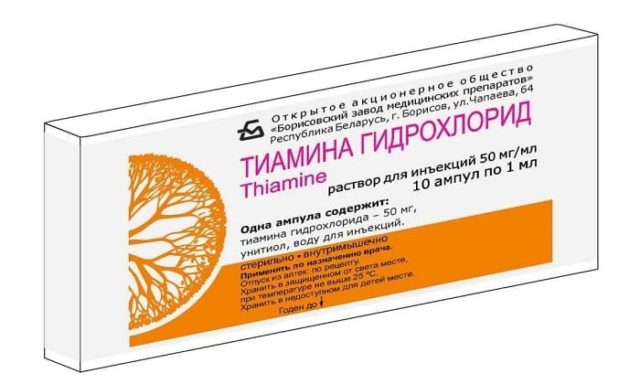
- Thiamine bromide... The tablets have a dosage of 2.58, 6.45, 12.9 mg.

- Thiamine chloride... The drug contains 550 ml of vitamin B1.

These preparations exclusively include vitamin B1 as an active ingredient. And they also produce various complexes containing B vitamins and other components:
- Combilipen Tubs... The Russian drug includes B1, B6 and B12, which go well with each other. Its use is advisable for neuralgia, neuritis, diabetic and alcoholic polyneuropathy. The course of treatment and dosage varies depending on the age of the patient and the purpose of use. It is recommended to take from 1 to 3 capsules per day for no more than 4 weeks.
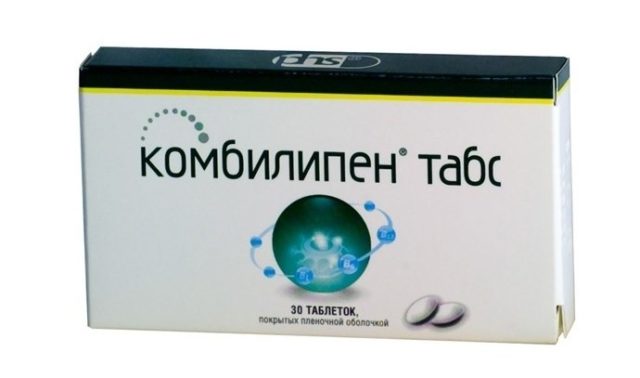
- Neurobion... The Japanese drug includes thiamine, pyridoxine, and cyanocobalamin. The agent is prescribed to restore sensitivity, normalize reflex reactions and reduce pain. The course of treatment should not exceed 1 month. The daily dose is 3 tablets, divided into several doses.

- Pentovit... The Russian complex contains B1, B6, B12, B9. The use of the additive helps to improve the condition of the skin and hair. The therapeutic course includes 4 weeks, during which 2 or 4 tablets of the drug are taken three times a day.

- Neuromultivitis. The Austrian preparation contains thiamine, as well as vitamins B6 and B12. The drug is prescribed for epileptic seizures, lumbar pain and neuralgia. The daily dosage is 3 tablets.

- Milgamma... The supplement includes thiamine and other vitamins of group B. The use of the complex is indicated for various diseases of the musculoskeletal system, neurological pathologies.
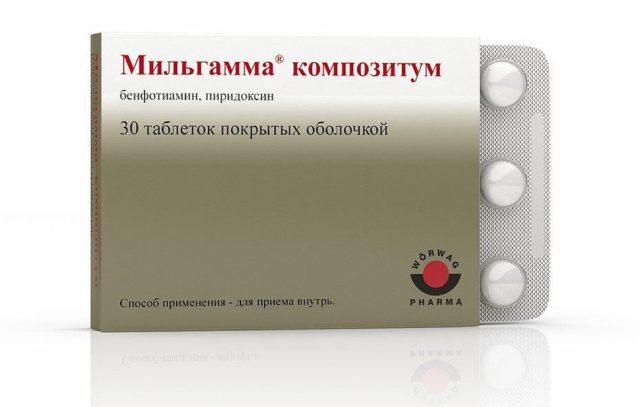
How to take vitamin B1
Thiamine preparations in tablet form are taken after meals with water, 1-4 times during the day. Taking pills on an empty stomach can provoke disturbances in the functioning of the digestive system. The duration of treatment is 1-1.5 months in adults, 3-4 weeks in children.
Thiamine injections are administered:
- intramuscularly;
- intravenously;
- subcutaneously.
The route of administration depends on the form of vitamin B1, the choice of which corresponds to the pathology and severity of the substance deficiency.
Combining thiamine with other vitamins
Experts note that intravenous administration of vitamins B1, B6 and B12 at the same time is not recommended due to the increased risk of an allergic reaction. When taken internally, all vitamins belonging to group B are combined with each other.
Precautions
Vitamin b1 has a positive effect on the body. When using drugs, the interaction of nutrients should be considered. Intravenous administration of multiple B vitamins is not recommended. Tablets should not be taken on an empty stomach in order to avoid the appearance of reactions from the digestive tract.
Contraindications and side effects
Vitamin B 1 is essential for the functioning of the body. Its use is undesirable in the presence of hypersensitivity, Wernicke's encephalopathy. Vitamin preparations should be used with caution in women in the climacteric period.
Side effects occur with oral thiamine supplementation on an empty stomach. They are manifested by disturbed stool and stomach pain. With the injection of a substance, allergies may occur.
Conclusion
The vitamin thiamine has a number of important functions in the body. Its sufficient intake ensures the well-coordinated work of organs and systems. The biological role of vitamin B 1 is to provide cells with energy. The component has a positive effect on the nervous system and the brain.Taking vitamin B1 supplements can prevent the development of serious illnesses.

